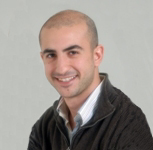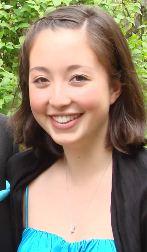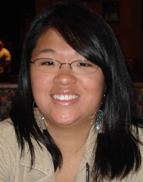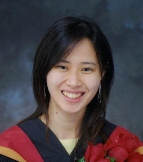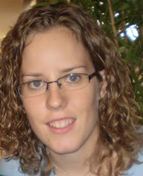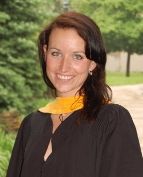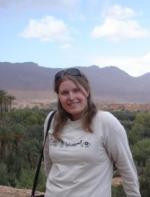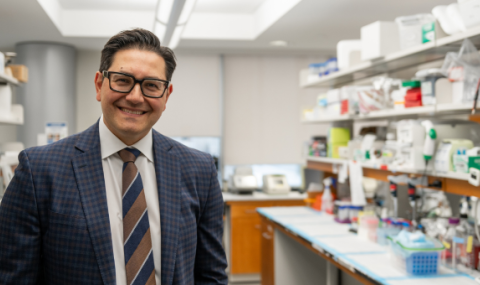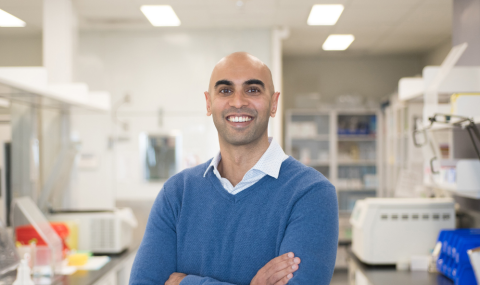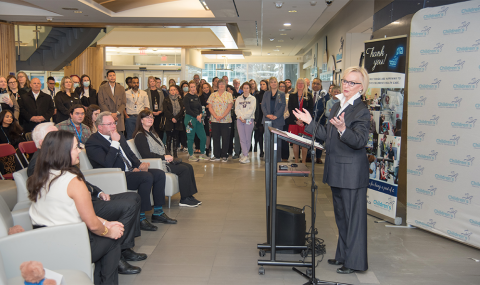Navid Baktash is an MSc student in the Department of Medical Biophysics, working under the supervision of Dr. John Lewis. Metastasis is the cause of 90% of cancer mortalities, which results in the ability of cancer cells to recruit vasculature and migrate. EGFL7 (epidermal growth factor like 7) is a protein that has been shown to be involved with poor patient outcome and expressed by a number of metastatic breast cancer cell lines, making it a potential therapeutic target. The goal of Navid’s project is to understand the role of EGFL7 in the metastasis of breast cancer cells.
Jenny Chu is an MSc student in the Department of Anatomy & Cell Biology, working under the supervision of Dr. Alison Allan. She is interested in the role of a specific type of breast cancer cell, the tumor-initiating cell (TIC), in breast cancer metastasis. She is investigating the interactions between TICs and different organs in the body to determine if these cells prefer one organ over another for secondary metastatic tumor formation. Her aim is to further the understanding of the metastatic process in order to identify new potential treatment targets.
Donna Cvetkovic - Our recent studies have demonstrated for the first time that kisspeptin-10 (KP-10) stimulates migration and invasion of estrogen-receptor negative human breast cancer MDA-MB-231 and Hs578T cells (that endogenously express kisspeptin receptor - KISS1R) by transactivating the epidermal growth factor receptor (Zajac, Law, Cvetkovic et al. PLoS ONE 2011). However, whether or not KISS1R signalling is directly required for metastasis is unknown and will be investigated here. Our objective is to determine whether: 1) expression of KISS1R promotes tumourigenicity of human non-malignant mammary epithelial MCF10A cells; 2) depletion of KISS1R in highly metastatic MDA-MB-231 breast cancer cells inhibits invasion, migration and metastasis.
Stephanie Dorman is an MSc student in the Department of Biochemistry, working under the supervision of Dr. Rogan. Her project involves designing diagnostic DNA probes that are targeted specifically to regions that will be informative for breast cancer patient care. It is now common in breast cancer diagnosis to characterize tumours using genome-wide assessments, establishing which genes have been altered, amplified, or deleted. In addition to genetic irregularities that are commonly tested for, the probe designs will determine the status of stable genetic targets of chemotherapy agents. The breast cancer focused designs provide an opportunity to reduce costs of diagnostic testing while allowing personalized treatment decisions to be made.
Leanna Dunn is an MSc student in the Department of Anatomy & Cell Biology, working under the supervision of Dr. Peeyush K. Lala. She is interested in the role of microRNAs (miRNAs) in Cyclo-oxygenase-2 (COX-2) induction of the aggressive breast cancer phenotype as well as the promotion of the tumor initiating cell (TIC) phenotype. Identification of TIC-associated miRNAs up-regulated in human breast cancer can be used as prognostic markers for screening and therapeutic responses in the clinic.
Ashley Esarik - Tumours are difficult to detect entirely because they contain subpopulations of aggressively invasive tumour cells that are resistant to radiation and chemotherapies. In this project, mimics of a peptide will be developed as imaging agents to detect breast cancer subtypes in patients. Early detection would allow for an improved outcome by separating the patients into different treatment streams depending on the degree of aggressiveness.
Ivan Kosik - Photoacoustic imaging uses safe-wavelength laser light to generate ultrasonic signals encoded with a broad range of information about the subject of interest. The development of an hand-held photoacoustic imaging system capable of decoding the ultrasonic data in real time to generate images of the volume of interest, holds the potential to significantly enhance the information pool used to classify abnormalities as malignant or benign
Irene Ma is an MSc student in the Department of Anatomy and Cell Biology, working under the supervision of Dr. Alison Allan. She is investigating the functional role of two proteins called aldehyde dehydrogenase and CD44, which are markers of highly aggressive breast cancers, by over-expressing these two proteins in breast cancer cells that are normally known to not metastasize. The goal is to determine whether or not the newly engineered breast cancer cells will have the same behaviour as the highly aggressive breast cancer cells, which could ultimately lead to the discovery of new therapeutic targets for drug development in the future.
Eldon Ng is an MSc student in the Department of Medical Biophysics working under the supervision of Dr. Jeffrey Carson. Eldon is working on developing a novel hybrid optical imaging system that combines the high contrast of optical imaging methods with the resolution of ultrasound detection. The hybrid Angular domain and Photoacoustic imaging system will be used to image surgically resected breast tissue samples and detect the presence of cancerous cells near the tissue margins
Choi-Fong Cho is an PhD student in the Department of Medical Biophysics working under the supervision of Dr. John Lewis. Her project involves studying how non-invasive imaging using nanotechnology should permit detection of early breast cancer before metastasis can occur. Her aim is to construct "smart nanoparticles" that home to the new blood vessels that form around early tumours. She hopes to use these as imaging agents both to diagnose early cancer and to enhance treatment.
Niamh Coughlan is a PhD student in the Department of Biochemistry working under the supervision of Dr. Joseph Torchia. She is studying the p/CIP/CARM1 coactivator complex in estrogen-dependent gene regulation in an attempt to clarify the role of the oncogene p/CIP in estrogen-dependent breast cancers. By identifying key target genes of the complex, and understanding the mechanism that regulates them, the hope is to develop new therapeutic strategies, leading to more effective treatment for p/CIP-overexpressing breast cancers.
Lori Lowes - My project focuses on examining the characteristics of cancer cells that are found in the blood of patients in hopes of finding better treatments for the cells that are capable of spreading throughout the body.
Rae-Lynn Nesbitt is an PhD student in the Department of Medical Biophysics, working under the supervision of Dr. John Lewis. She is studying ways to develop targeted non-invasive therapy of breast cancer using “fusogenic liposomes”. Due to chemotherapy’s harmful effects, loading these lethal drugs in a protective packaging that targets tumours would result in a safer administration. This form of a targeted drug transporter will provide clinicians with a powerful tool to treat breast cancer with decreased damaging effects.
Mateusz Rytelewski - Mateusz Rytelewski is a PhD student in the Department of Microbiology and Immunology, under the supervision of Dr. Koropatnick. His research is focused on targeting DNA repair enzymes using antisense strategies, in combination with anti thymidylate synthase (TS) treatment, to investigate the effects of this therapeutic regimen on human tumour cell survival and growth. Though reduced DNA repair capacity caused by mutations in DNA repair enzymes and transcription factors increases patient susceptibility to disease, clinical data suggests that the presence of these same mutations in cancer cells increases the success of cancer therapy. He will also be exploring the mechanistic details which modulate cancer cell biology in this system, including the possible contribution of the immune system
Camilla Urbaniak - The bacteria that are naturally found in our bodies have been shown to play an important role in many diseases that have been on the rise in the last 20 years. We believe that the same holds true for breast cancer and that certain bacteria may promote cancer while others may prevent it. By identifying and isolating the bacteria found in cancerous and non-cancerous breast tissue and breast exudates, we will have a better understanding of the mechanisms by which bacteria can influence breast cancer.
